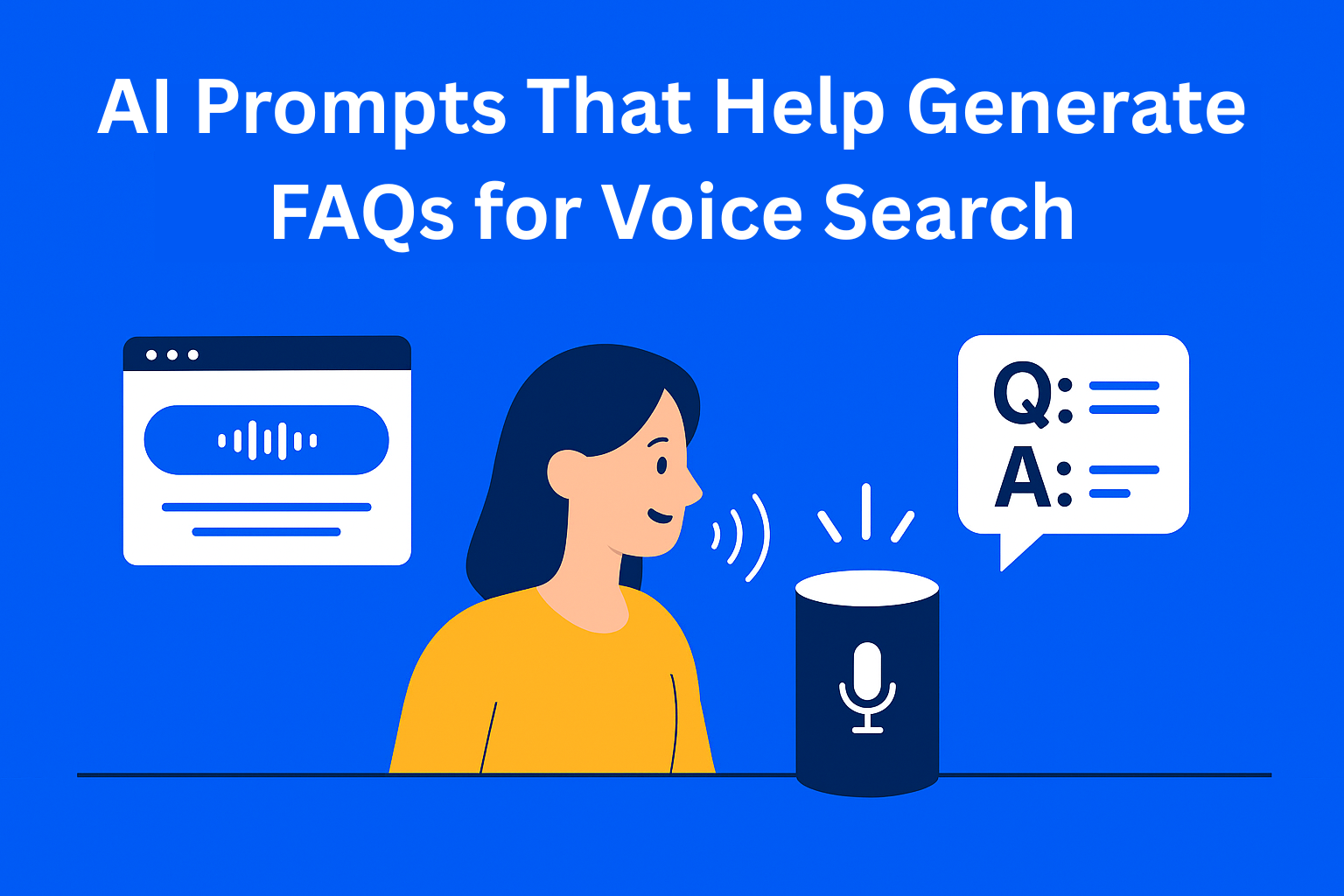AI Prompts That Help Generate FAQs for Voice Search
Learn how AI prompts can help you create SEO-friendly FAQs tailored for voice search. Discover simple tips, examples, and best practices to make your content sound natural, boost visibility, and give users quick answers through Google Assistant, Siri, and Alexa.

Imagine asking your phone: “What’s the best way to clean sneakers?” or “Where can I buy an affordable vacuum cleaner?” More and more people are using voice search through assistants like Google Assistant, Siri, or Alexa. The difference is that while we type just a few words in a search box, with voice we ask natural questions. That’s why having a website with a FAQ (Frequently Asked Questions) section has become extremely important for visibility in search results.
But writing good FAQ questions and answers isn’t easy. You need to understand how users actually ask, not just what we think they might want. This is where artificial intelligence steps in. With the right AI prompts, we can quickly generate questions and answers tailored for voice search.
Key Takeaways
- Voice search changes SEO - people ask full questions instead of typing short keywords, so content must sound conversational.
- AI prompts generate FAQs fast - clear instructions help create natural questions and answers tailored for voice queries.
- Good FAQs boost visibility - assistants like Siri or Alexa pull concise, direct answers straight from FAQ sections.
- Best practices matter - keep answers short, use everyday language, and include “how to” or “where can I” phrasing.
- AI + SEO tools work together - combine ChatGPT with Ahrefs, SEMrush, or Moz to align FAQs with real user searches.
What Are AI Prompts?
Even though it seems obvious, it’s worth repeating in case someone doesn’t know. An AI prompt is simply an instruction we give to an AI tool (like ChatGPT) to generate the content we want. It can be a sentence, a question, or a request. For example:
- Bad prompt: “Write me an FAQ.”
- Better prompt: “Generate 10 questions that users might ask about using an electric bike, especially ones they might ask via voice search.”
The difference is clear. The more detailed the prompt, the better the result.
Why Are FAQs Important for Voice Search?
FAQs are the part of a website that answers the most common user questions. When someone asks by voice: “How do I use this app?” or “How can I increase my Instagram followers?”, algorithms look for exactly these kinds of clear and direct answers.
Voice search is different from traditional search. People don’t just say “best coffee NewYork,” they ask “Which café in New York has the best coffee?” That’s why it’s important to have FAQ content optimized for natural speech.
The key difference is that SEO for text search often relies on short phrases, while for voice search it’s more important to create content that sounds conversational.
How to Create AI Prompts for FAQ Generation
Step 1: Understand user intent
People usually look for three types of answers:
- Information (“What is...?”),
- Navigation (“Where can I find...?”),
- Transactions (“How can I buy...?”).
Step 2: Formulate precise prompts
Here are a few examples:
- “Generate a list of 15 questions that users often ask about [product/service] when using voice search.”
- “Write answers to these questions in a friendly, conversational tone, with sentences no longer than 20 words.”
Step 3: Test and refine
Read the answers out loud. If they sound natural and easy to understand - you’ve got the right tone. If they feel too complicated, simplify them.
Examples of AI Prompts for Voice Search FAQs
To see how this works in practice, here are examples from different industries:
E-commerce:
- “Generate 10 questions people ask when buying sports sneakers online and write short answers.”
- Possible questions: “What are the best running shoes for rainy weather?” or “How do I know which size to order?”
Healthcare:
- “Write frequently asked questions about spring allergy symptoms and add clear answers a doctor would give to a patient.”
- Possible questions: “What are the symptoms of seasonal allergies?” or “When should I see a doctor?”
Travel:
- “Generate an FAQ list for travelers looking for cheap flights to Paris.”
- Possible questions: “What’s the best time of year to buy cheap airline tickets?” or “How can I book a flight in advance?”
A single good prompt can generate more than ten useful FAQ questions you can immediately add to your website.
Best Practices
To make your FAQs truly effective for voice search, follow a few rules:
- Use natural language - Write the way people speak. Instead of “product benefits,” say “What are the advantages of this product?”
- Keep answers short and clear - Voice assistants read out loud. If the answer is 4-5 sentences long, it’s harder for users to follow.
- SEO and Voice Search optimization - Include phrases people often use in everyday conversation: “how to,” “where can I,” “the best way.”
- Structure - FAQ sections should be easy to read and scan, both for users and algorithms.
Tools and Resources
Today, there are many AI tools that can help you create FAQ content optimized for voice search. Some of the most commonly used are:
- ChatGPT
- Claude
- Gemini
You can combine these tools with SEO software like Ahrefs, SEMrush, Moz, or Ubersuggest to track which words people search most and align them with your generated FAQs.
Conclusion
Voice search is already part of everyday life. When users want quick and clear answers, they don’t type - they ask. That’s why FAQ sections optimized with AI prompts are a huge advantage for any business.
If you haven’t tried it yet, start with a simple prompt:
“Generate 10 frequently asked questions and answers for [my product] that people might ask by voice.”
You’ll be surprised how many useful ideas you can get in just a few seconds.






